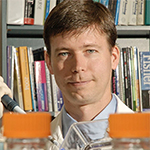University of British Columbia, in collaboration with BetaLogics Venture, a division of Janssen Research & Development, LLC, has published a study highlighting a protocol to convert stem cells into insulin-producing cells. The new procedure could be an important step in the fight against Type 1 diabetes.
The protocol can turn stem cells into reliable, insulin-producing cells in about six weeks, far quicker than the four months it took using previous methods.

Dr. Timothy Kieffer
“We are a step closer to having an unlimited supply of insulin-producing cells to treat patients with Type 1 diabetes,” says Timothy Kieffer, who led the research and is a professor in UBC’s Department of Cellular and Physiological Sciences and the Department of Surgery.
The protocol transforms stem cells into insulin-secreting pancreatic cells via a cell-culture method. The conversion is completed after the cells are transplanted into a host.
“We have not yet made fully functional cells in a dish, but we are very close,” says Kieffer. “The cells we make in the lab produce insulin, but are still immature and need the transplant host to complete the transformation into fully functioning cells.”
An important next step for UBC researchers and their industry collaborators is to determine how to prevent the insulin-producing cells’ from being rejected by the body.
The research was published Sept. 11 in the journal Nature Biotechnology. It can be found here.
The research was supported by the JDRF, the Canadian Institutes of Health Research, the Stem Cell Network of Canada, Stem Cell Technologies of Vancouver, and the Michael Smith Foundation for Health Research.
Background
More than two million Canadians and close to 400 million people worldwide suffer from diabetes.
Type 1 diabetes is the result of the body’s own immune system destroying insulin secreting pancreatic beta cells.
Current treatment requires daily insulin injections. Experimental human donor transplants of healthy pancreatic islets, which contain the beta cells, have had success. But treatment is limited by donor availability and the need for strong immunosuppressive drugs to prevent rejection of the transplanted cells. Also in development is an artificial pancreas device that can be implanted into a diabetes patient. The secretion of insulin would be controlled and monitored by a cell phone.
For more information on Kieffer’s research, click here.
For more information on the UBC Diabetes Research Group, click here.